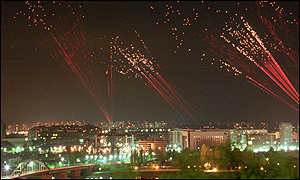
This is a document in Serbian
and English
where you can find various
information concerning
the NATO military action
against Serbia.
Bombing The Cradle Of Civilization
David Orchard
So the nation with more "weapons of mass destruction" than any other tells us to beware of Iraq.
The country which has done more invading than any in history warns, "Iraq must be stopped."
Iraq "may" possess and "might" use chemical and biological weapons, says the U.S. - which has used them repeatedly, from Vietnam to Cuba, and now proposes to blow whatever amounts Iraq may have into the atmosphere, with nuclear weapons if necessary.
Iraq is an "unpredictable
rogue state," announces Washington, which in 1991
fired 900 tons of depleted
uranium into Iraq, drenching it with permanent,
radioactive contamination.
Iraq is a threat to world peace, Bill Clinton and Tony Blair declare. Did Iraq overthrow Guatemala's government, 1954? Attack Cuba and assassinate Congo's prime minister, Patrice Lumumba, 1961? Invade the Dominican Republic, 1965? Drop 10,000,000 tons of bombs, chemicals and napalm on Vietnam, Laos and Cambodia, 1965-1973? Overthrow and assassinate Chile's Salvador Allende, 1973? Invade Grenada, 1983 and Panama, 1989? Saddam Hussein is accused of being a modern Hitler. How has a small, virtually landlocked country, dependent on imported food and exports of oil - both cut off by sanctions - publicly stripped of its weapons, embargoed and guarded by a phalanx of the world's most advanced weaponry, inspected 2,186 times over seven years, incapable of even flying over its own territory, become equal to Nazi Germany?
War may come, our leaders
say. How is war possible when only one side has
weapons? Is the operative
word not massacre?
Iraq is a Third World country, smaller than the province of Saskatchewan; its population is roughly 20 million with an average income today, according to the New York Times, of $2 per month.
Devastated during the
one-sided 1991 Gulf War - U.S. officials referred to it as a "turkey shoot"
- Iraq has since been bled white by seven years of
sanctions and embargo.
Since 1991, over one million Iraqis have died a slow
starving death, (two-thirds
of them children, making mockery of the U.N.
declaration on the Rights
of the Child), and millions more are suffering
physical damage and
drastically shortened lives. The majority of the
population is reduced
to "semi-starvation," according to the World Health
Organization. Radiation-ravaged
and deformed children are denied any relief
from their agony by
an embargo harsher than that imposed on Germany following World War II.
The recent U.S. Bishop's statement to President Clinton reads, "Epidemics
rage, taking away infants and the sick by the thousands..." The starvation
of a population is clearly prohibited by international law, even during
war, yet under this embargo a child is dying in Iraq every ten minutes.
Now Iraq faces another overwhelming attack by the world's superpower -
and a few sycophantic spear-carriers, including Canada. This is not a U.N.
action. The Security Council has not authorized it and the U.N. Charter
does not authorize member states to take unilateral military action.
In 1804, Haiti was the
first Latin American country to achieve its
independence, through
a slave revolt. The U.S., supported by Britain, imposed a 60-year embargo
on the island; it did not want slave rebellion at home. For almost 40 years,
Washington has embargoed Cuba and attempted to assassinate its leaders.
Independence in the Caribbean continues to be an offence.
For 30 years the U.S.
blockaded Vietnam. Vietnam's crime? It defeated the
U.S.A. Now the U.S.
refuses to lift the embargo against Iraq. Why? Almost a
century ago, Britain
seized the Persian Gulf area, and carved a border between Iraq and Kuwait
- a division never accepted by Iraq and renounced formally by it in 1961
after it overthrew the British-imposed monarch and achieved independence.
In the 1930s, Britain conceded the entire oil reserves of the region to
U.S. and British interests.
In the 1970s, Iraq nationalized (with compensation) its oil industry and its citizens achieved a very high standard of living. In 1989, a high power U.S. delegation visited Baghdad and demanded Iraq privatize its oil industry. Iraq refused. Today Iraq stands in the way of complete U.S. (and British) control of the oil resources of the Gulf.
In 1951, the Mossadeq
government of Iran nationalized its oil. Britain and the U.S. imposed draconian
sanctions and two years later the U.S. overthrew
Mossadeq, calling him
"that madman." In the early 1970s, Libya nationalized
its oil reserves and
built impressive health, education and construction
projects in that once
impoverished nation. President Nixon publicly reminded Libyan leader Moammar
Gaddaffi of Mossadeq's fate and U.S. officials began referring to Gaddaffi
as a "Hitler," a "terrorist" and a "mad dog." In 1986, the U.S., supported
by Britain, bombed Libya, wounding Gaddaffi's wife, injuring all seven
of his children, and killing his infant daughter.
When Pierre Trudeau's
government introduced the National Energy Programme,
1980, with its goal
of 50% Canadian ownership of the industry, Washington,
outraged, publicly warned
that "relationships are sliding dangerously towards crisis." U.S. officials,
referring to the 1973 Chilean coup, spelled out a plan to topple Trudeau
by "destabilizing" Quebec and Ontario.
Now Ottawa has volunteered
to help Washington unleash the world's most
horrendous weapons in
an illegal and profoundly racist holocaust against the defenceless citizens
of the cradle of recorded civilization.
Call it privatization
at the point of uranium-tipped missiles.
